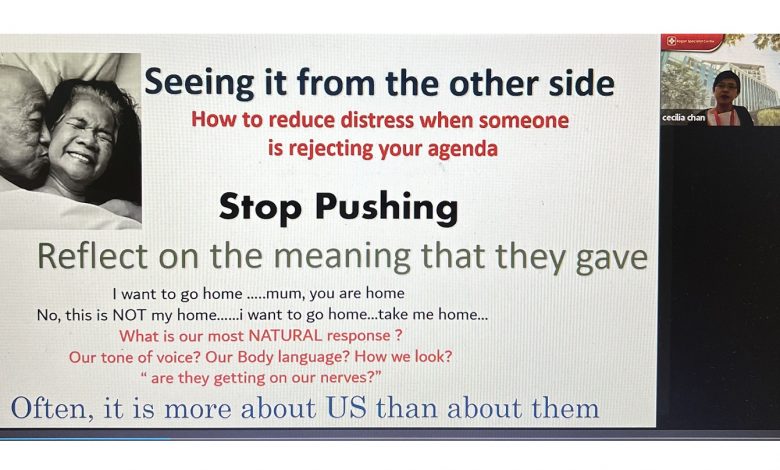The Art of Effective Communication in Dementia


Oftentimes, dementia is more than just memory loss; communication with loved ones also becomes an obstacle. Although the situation is usually unintended, it might lead to a perpetual misunderstanding. Dr Cecilia Chan, a dementia care advocate, shared some insightful key notes with us on how to freshen up interactions with someone living with dementia.
She told us that there are other ways to connect meaningfully with each other and when it comes to interacting with people with dementia, you will have to put on your detective hat. So, in order to bridge the gap, one needs to make the issue comprehensive—that is one method to figure out what went sideways.
As a care partner, we need to understand that those living with dementia are dealing with brain changes, as such we have to tweak the way we communicate to support them. Cecilia explained that even though one’s processing may deteriorate as they age, they are usually still in touch with the function of their brain. They just require more effort to remember certain things.
The dementia care advocate reminded us that dementia is not an old people disease because it has nothing to do with age. It is brain failure wherein the brain goes through structural and chemical changes as it shrinks from the inside and outside.
“People with dementia cannot articulate, the wiring system is missing. Hence, there’s an unmet need. It’s important that we recognise our tone, body language and facial expression when we are responding to them,” she said.
To steer clear of arguments and misunderstandings, you would want to first establish a positive relationship. If the essential ingredient of trust is not present, it might create an unpleasant environment for both parties. If their behaviour seems odd, you know it’s time you take a step back and understand what they are trying to tell you. Never disregard their needs!
“Relationships should be your primary goal and agendas (tasks) should be placed secondary, not the other way round. You are here to give them extra help, not to take over their life. If you introduce the tasks (e.g. grooming, eating and bathing) without taking the first step of building a bond, you are indirectly stripping them of their dignity, self worth and independence,” she stressed.


Other things to note in your speech include:
- Tone of voice: Try to sound friendly and not bossy or critical
- Pitch of voice: A deep pitch is better
- Speed of the speech: Slow and easy and use their words to validate them
What happens if our loved ones say No to us?
“We get agitated, we just want to finish our tasks. What you have to do is learn to see it from their point of view. If they push you and you push back, it will cause unwanted distress. If what you are doing is not working, then stop. Give them time and space,” Cecilia explained.
How to approach them?
Cecilia also shared some tips on how to approach a person with dementia. These include:
- Knock, announce your presence, and get their attention and permission before entering the room
- Greet and smile; look friendly and call them by their name
- Move slowly and offer your hand in a ‘handshake’ position
If you want to get the person to do something, you have to give them a choice. Make sure to make your message about what is happening direct and short. It is important to involve them in what you do, for example, ask the person to help you do something and see if they will give it a try. In addition, if it is a lengthy task that requires a lot of work to accomplish, make sure to break down the task and give it one step at a time, don’t overwhelm them.
When interacting with people living with dementia, a friendly approach is always encouraged. Go with the flow, acknowledge their emotions (e.g. if they are feeling sad, recognise it) and always look interested and be prepared for some emotional outbursts.
Gisele Soo
=============================
Get your local news fast. Download the Ipoh Echo App on your mobile. Available on both Google Playstore and Apple Appstore.


